Each year, the Center for the Advancement of Teaching celebrates the recipients of the Distinguished Teaching Awards at the Andrea L. Rich Night to Honor Teaching ceremony held at the Chancellor’s Residence. Unfortunately, due to the COVID-19 pandemic, the ceremony that would have taken place in 2020 was cancelled and the 2020 cohort of awardees was never honored with a Night to Honor Teaching event. This article shines a light on these deserving awardees.
The Distinguished Teaching Awards are UCLA’s highest teaching honor, recognizing individuals who bring respect and admiration to teaching at UCLA. The recipients are selected by the Academic Senate Committee on Teaching and separated into three award categories – six senate faculty members, three non-senate faculty members, and five teaching assistants.
To honor the achievements of the Non-Senate Faculty recipients of the Distinguished Teaching Awards, we are highlighting the exemplary qualities that make these educators serve as role models for their colleagues and the dynamic, innovative approach to their work that inspires our students to a lifetime of learning and achievement.
John Gavin Branstetter, Department of Political Science
Professor Branstetter’s approach to teaching is grounded in the assumption that no one can fully master the core material of political theory. Learning is an open process without a single, objective goal and individual students can benefit in very different ways from studying the same subject. He guides students to the things he has already discovered, but also tries to draw attention to the moments when students lead him to something new and exciting as well. By treating students as equals, he is successful in helping students get excited about political theory.
Professor Branstetter creates a classroom atmosphere in which everyone feels that they are all invested in reaching the same goal. He combines a friendly and empathetic demeanor with careful attention to detail and organization. He communicates his enthusiasm for the material and his confidence in students’ ability to master with wholehearted sincerity. He sees motivation as the key to learning and confidence as the key to motivation. He helps students build this confidence by fostering a cooperative and egalitarian classroom environment, one where learning is approached as a journey taken together.
Margaret Ellen Davis, Writing Programs
Professor Davis is a transformational teacher, whose energy and passion for teaching enlivens all she does. Positive engagement with students forms the bedrock of her pedagogy. At the core of her classroom success resides an abiding respect for students. She makes them feel that their ideas matter, that they matter, and that they have something to contribute. Through her collaborative teaching style, her students see ideas and practices that they can challenge, discard, experiment with, perfect, and enliven.
Professor Davis views teaching as a form of advocacy and wants her students to explore, to persuade, to reflect, to motivate, but most importantly, to see themselves as writers rather than task-completers. Students view the skills and capacities they develop with her as essential for not just their courses but for their lives.
Cindy Kratzer, Graduate School of Education and Information Studies
Professor Kratzer’s philosophy of teaching is to empower students to learn. Accolades from students underscore her deep commitment to research-based teaching methods, her devotion to the success of all students, and her empathy for the personal needs of each individual. She tries to understand each student’s learning style, and differentiates her teaching style and provides support accordingly.
Professor Kratzer analyzes and reflects on her teaching, and innovates to help students achieve their potential. One student writes, “she gave us the confidence to be resources to one another. Dr. Kratzer’s approach created a classroom community that was grounded in respect, collaboration, and open communication.” Professor Kratzer’s expertise is learned, absorbed, implemented, and reconstructed by her students, who become experts themselves, training a widening circle of other educators.
View all the 2020 DTA recipients’ interview clips on the 2020 Night to Honor Teaching page.




